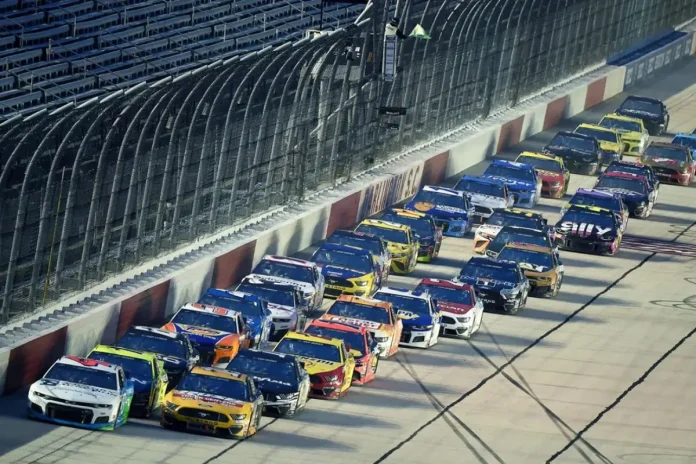How NASCAR can revive its Playoff Format, NASCAR must prioritize race winners and competitive balance. Current dissatisfaction stems from champions with mediocre performances, such as with Ryan Blaney’s single win in 2023. Proposed changes include extending the championship round to three races and implementing a seeding system that rewards early victories. Furthermore, rotating championship venues could infuse excitement and fairness into the series. These adjustments could align outcomes more closely with merit, enhancing fan engagement and satisfaction.
Key Highlights
- Extend the championship round to three races, allowing for more competitive opportunities and excitement for fans.
- Implement Denny Hamlin’s proposal of double points for the regular season to reward consistent performance.
- Rotate the championship race venue annually to enhance unpredictability and keep fans engaged.
- Prioritize race winners for playoff qualification, ensuring that the most skilled drivers compete for the championship.
- Incorporate fan feedback into playoff format reviews to align the system with audience expectations and desires.
Championship Outcome and Fan Reactions
The recent championship outcomes in the NASCAR Cup Series have sparked considerable debate among fans and analysts regarding the effectiveness of the playoff format. The crowning of Joey Logano as the 2024 champion, despite an average finishing position of 17.1 and only seven Top-5 finishes, has reignited discontent among the fan base.
This follows Ryan Blaney‘s similar Cinderella story in 2023, where he clinched the title with a lackluster regular season characterized by just one win and a modern-era record for the fewest Top-5 finishes by a champion.
These outcomes challenge the traditional notion of meritocracy in racing, where consistent performance throughout the season is expected to be rewarded. Proponents of the playoff system argue that it fosters excitement and unpredictability, providing dramatic narratives like Blaney’s and Logano’s.
However, many fans feel that these narratives come at the expense of recognizing true excellence, as evidenced by the frustrations voiced on social media and among industry insiders.

The reactions from fans have grown increasingly vocal, prompting NASCAR executives to acknowledge the need for a review of the playoff system. As NASCAR’s Elton Sawyer indicated, the organization is open to input from fans and stakeholders, highlighting an awareness of the growing dissatisfaction.
This critical crossroads presents an opportunity for NASCAR to recalibrate its playoff format to better align with the expectations and desires of its dedicated fan base, ensuring that champions reflect both drama and consistent performance.
Overview of the Current NASCAR Playoff System
Amid ongoing discussions about its effectiveness, the current NASCAR playoff system, introduced in 2004 and refined over the years, presents a unique blend of competition and strategy designed to heighten excitement.
The format begins with a 26-race regular season, where drivers aim to secure a spot in the playoffs by winning races. Significantly, race winners automatically qualify for the 16-driver playoff field, unless the number of unique winners exceeds 16. This creates a dynamic where consistency and victory are similarly paramount.
As the playoffs commence, drivers enter a three-race Round of 16, with points reset from the regular season, carrying over only playoff points accrued. Winning a race guarantees advancement to the next round, highlighting the importance of peak performance during this critical phase.
Subsequently, the system narrows the field through Rounds of 12 and 8, with four drivers eliminated in each round, intensifying competition.
The climax of the playoff format culminates in the Championship 4, where the final race determines the season champion. In a distinct twist, all Championship 4 drivers start on equal footing, with no stage points available, aligning the focus solely on the race outcome.
This format aims to create a thrilling finale, emphasizing the merit of racing skill and strategy. While this system has fostered memorable moments and dramatic finishes, its efficacy in satisfying fan expectations continues to be a subject of critical discourse within the NASCAR community.
Potential Tweaks to the NASCAR Playoff System
While the current NASCAR playoff format has generated excitement and memorable moments, discussions surrounding potential tweaks reveal a desire for improvement among fans and stakeholders. Several proposals have emerged, each aiming to improve competitive balance and fan engagement.
One option is to maintain the playoffs but stretch the final championship round across three races. This approach would echo the previous 10-race Chase format, allowing drivers to earn stage points during these critical events without carrying over playoff points. Such a system would introduce more variability and drama, reflecting traditional playoff structures in other sports.
Conversely, Denny Hamlin’s proposed format offers a different vision—double points for the regular season, followed by a seven-race playoff round featuring all 16 qualifiers. After this round, points would reset for the final three races with the top four contenders vying for the championship. This structure emphasizes the significance of the regular season while maintaining tension throughout the playoffs.
Another intriguing suggestion involves rotating the championship race annually. Given the inherent advantages some drivers have at specific tracks, such as Phoenix, this approach would level the playing field. By diversifying the venue, NASCAR could increase excitement and unpredictability, ensuring that no single driver enjoys a built-in advantage.
As NASCAR considers these potential tweaks, the overarching goal must be to balance tradition with innovation, ultimately delivering a playoff experience that captivates both loyal fans and newcomers similarly.
Steve Letarte’s format
One potential reform gaining attention in NASCAR is Steve Letarte’s proposed playoff format, which fundamentally shifts the qualification criteria to prioritize race winners. This groundbreaking approach, shared on Denny Hamlin’s podcast, stipulates that only drivers who win races during the initial 26 events of the season would qualify for the playoffs, effectively eliminating the possibility of advancing through a points system alone.
Under Letarte’s format, playoff drivers would be seeded based on the bonus points accrued from race and stage victories throughout the regular season, granting a competitive edge to those who excel early on. This seeding strategy not only rewards performance but also amplifies the stakes of each race, as drivers would be motivated to secure wins rather than merely accumulating points.
The conclusion of this format would see a final championship round comprised of the top four drivers competing across three races. The flexibility in the elimination process before this round allows for either a more traditional elimination format or a fresh seven-race prelude, maintaining interest and suspense leading into the finale.
Moreover, the rotation of venues for the championship races introduces an element of unpredictability and excitement, ensuring that no single location can dominate the narrative of the title chase.
Letarte’s proposal represents a noteworthy departure from previous systems, emphasizing meritocracy in securing a playoff berth and promising to reinvigorate fan engagement through a more dynamic and competitive framework.
News in Brief: How NASCAR Can Revive Its Playoff Format
A a revitalization of the NASCAR playoff format could improve both competitive integrity and fan engagement. By addressing the shortcomings of the current system and considering creative proposals, such as Steve Letarte’s format, NASCAR may successfully align its championship outcomes with fan expectations.
Implementing tactical adjustments could lead to a more thrilling and equitable playoff experience, ultimately fostering a deeper connection between the sport and its audience while ensuring the championship remains a prestigious and exciting event.
ALSO READ: Steve Letarte Calls Phoenix Race ‘Sleepy’ and Denny Hamlin Defends It—Who’s Right?




